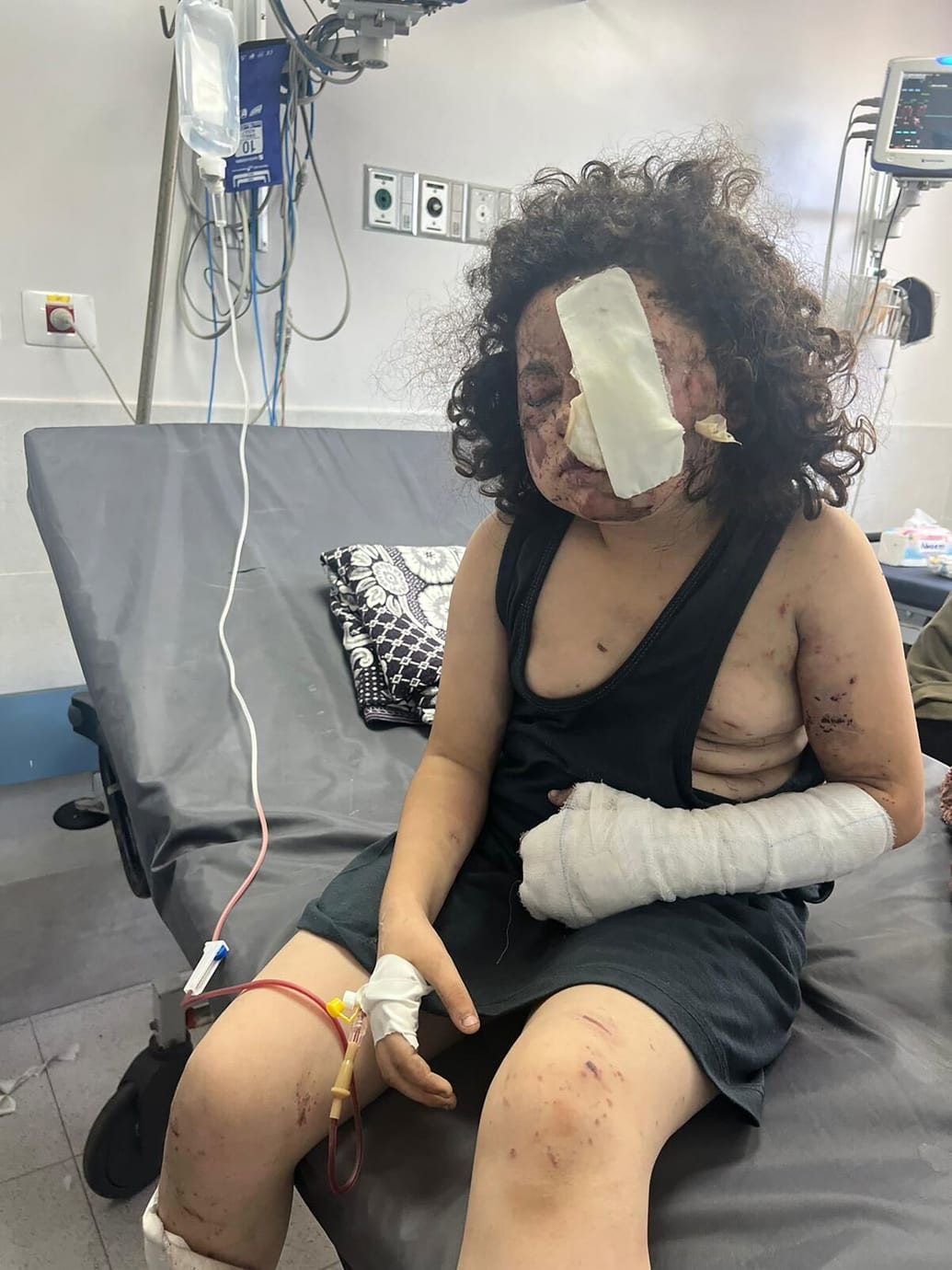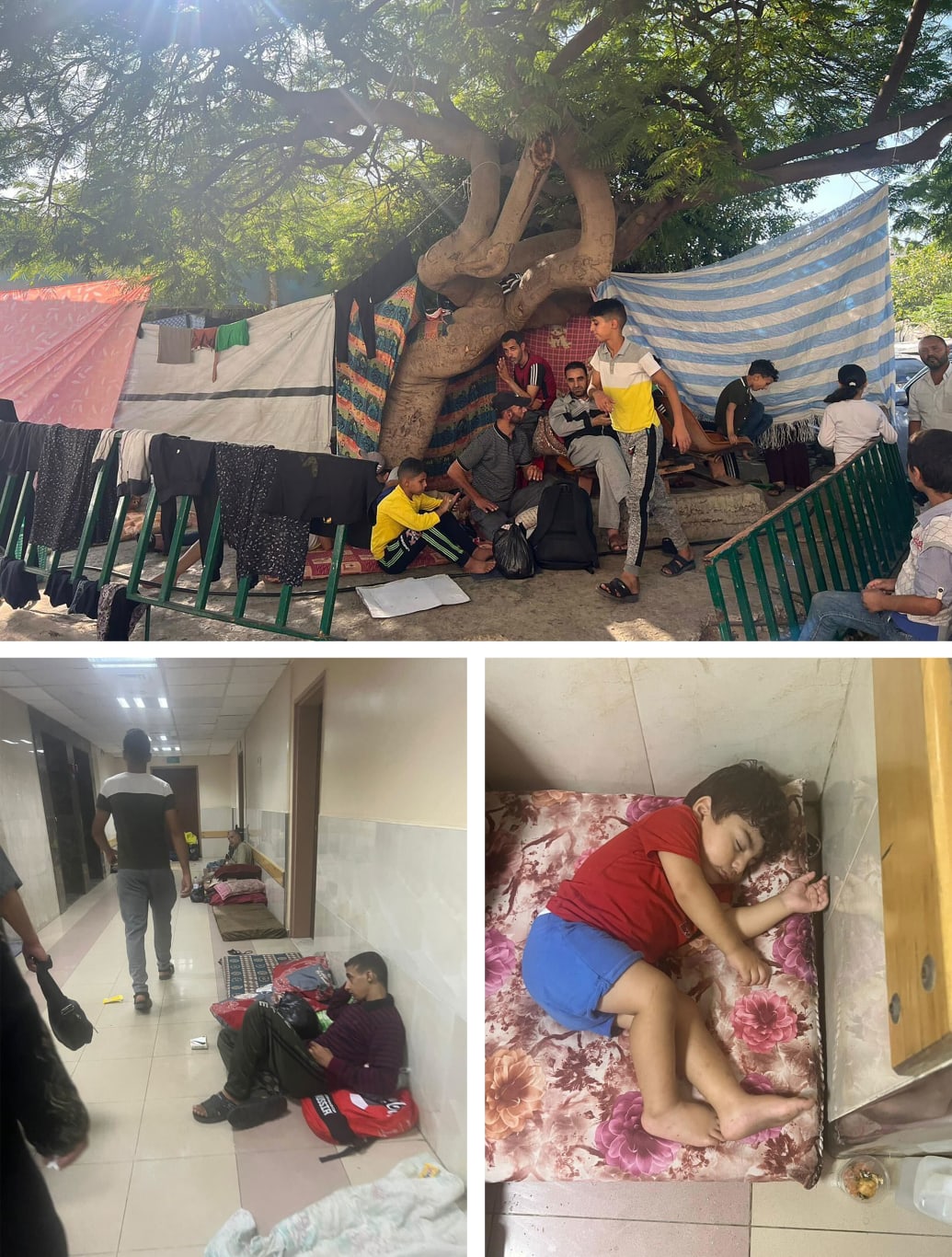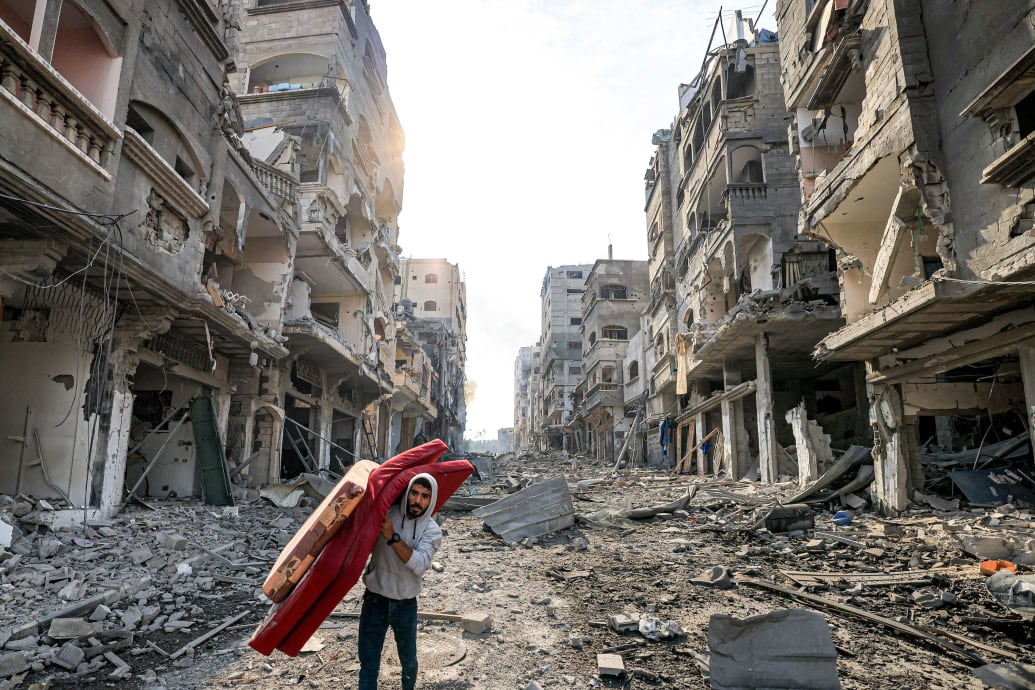(The author of this story is anonymous for safety reasons.)
GAZA CITY—Conditions in the south of Gaza where Israel told civilians to flee are so crowded and miserable—with no electricity, water or reprieve from airstrikes—that many have decided to return to their homes and accept the consequences.
Imad Abdelfattah, 42, fled with 14 relatives—including his mother, father, and his sister’s young family—after Israel ordered civilians to leave the northern half of the Gaza Strip before an expected ground invasion in response to Hamas’ brutal incursion into Israel last week.
They sought shelter on Friday at the Nussierat refugee camp—one of the zones designated safe by Israel—but the nightly airstrikes were devastating, and the lack of water, electricity, and basic supplies convinced them that they might as well head home to western Gaza City after just two days.
“We decided to face the dire situation at home with dignity, as conditions at the refugee camp were unbearable, and there were no alternative shelters to escape to,” he told The Daily Beast.
Back home on Monday, Abdelfattah said he had been unable to secure clean drinking water for his family. “I tried to buy drinking water from the shops in Gaza, but there was none available. We are forced to drink water from the underground well, which is salty and normally just used for cleaning.”
Airstrikes continued to pound civilian districts all across Gaza despite Israel’s insistence on a mass evacuation to the south. At least 70 people making their way into the supposedly safe zones were killed over the weekend when airstrikes hit their convoy. A doctor who works right on the southern border with Egypt even told The Daily Beast that his hospital had received a call warning them to evacuate on Sunday. It appears that nowhere is safe.
Many of Gaza’s hospitals in the north—which are supposed to be protected under international law—were already warned to evacuate by the Israel Defense Forces.
Inside one of those hospitals, where fuel supplies will run out at midday on Tuesday according to the department of health, is 7-year-old Jana Dawood. After life-saving surgery, her spirit remains resilient despite a harrowing Israeli airstrike that struck her family’s home on al-Nasser Street in Gaza City, leaving her with head and eye injuries.

“The house was targeted without warning,” her uncle, Belal Dawood, 31, told The Daily Beast inside al Shifa hospital in Gaza City.
“My brother, Ahmed, is Jana’s father and he bears the scars of burns that engulf his body. His wife endured shrapnel wounds to her stomach, skilfully removed by the dedicated doctors. All Ahmed’s children are injured, currently receiving treatment at the hospital.”
Describing the horrific event, he recounted what Ahmed said, “The rocket descended like an inferno from the ceiling to the floor below, igniting a fierce blaze that seared my body. Shrapnel fragments filled the air around us.”
With a profound longing for peace and security, Belal added, “We don’t yearn for border crossings, we don’t seek airports, we don’t covet riches. All we truly desire is to lead a life of tranquility and safety, just like any other nation.”
“The medical capabilities are limited here, and I wish I could take Jana for treatment in Egypt or another country, but the closure of crossings makes us powerless,” Bilal added.
As young Jana lay in her hospital bed—her eyes concealed beneath white bandages, her face swollen from the injuries—she turned to her uncle, Belal, and asked with a hint of hope: “When are we going back home?”
Unaware of the devastating reality that her home had been destroyed and there was nowhere safe to go, Jana’s inquiry hung in the air unanswered, a poignant reminder of the innocence disrupted by harsh realities of war.
Umm Ahmed, 51, spoke to The Daily Beast while cradling her 2-year-old grandson close to her heart. The boy’s mother, Lana al-Haddad, 28, had been heavily pregnant with a baby sister when the family’s home was struck by an airstrike.
“She is in the intensive care unit after being rescued from the debris of her house. Many of her family were killed and found under the rubble,” Ahmed said.
It was just two weeks before her due date, and al-Haddad suffered a fractured pelvis as her home collapsed on top of her. After she was rescued from the rubble, she made it to the hospital where she had an emergency Cesarean section. Both Lana and her newborn baby girl are in the intensive care unit, which may only have hours of power left.
Umm Ahmed said: “I‘ve heard stories of Israeli female settlers who gave birth in Gaza who were nurtured and protected by the resistance. So, why are our children and pregnant women subjected to such violence by Israel? What sins have they committed? And why are they not afforded the courtesy of a warning?”

Survivors seek shelter in the grounds of al Shifa hospital.
The Daily Beast
The director general of al Shifa Medical Complex in Gaza, Muhammad Abu Salamiya, warned that the lives of hundreds of patients in the hospital would be threatened if the fuel ran out. “Without fuel or electricity, hospitals will stop working and will become graveyards,” he told The Daily Beast, saying they had already run out of beds and were struggling to get water.
The Gaza Health Ministry said 2,750 Palestinians have been killed and 9,700 wounded in the Israeli airstrikes which followed the Hamas and Islamic Jihad assault on Israel on Oct. 7. The conflict has become the most deadly of five wars fought between Israel and Gaza with 1400 Israelis killed and at least 199 taken hostage.
Mohammed Majed, 30, who lives in western Gaza City, told The Daily Beast he had witnessed Israel using the incendiary weapons against the civilian population, which is prohibited under international law.
“I was sitting with my children on the fifth floor of our building, watching the news on my mobile. Suddenly, the Israeli navy initiated an attack on the beach, just a few meters from us,” he said. “We saw ambulances rushing to evacuate the occupants of the hotels located along the beach. Then, out of nowhere, we witnessed the horrifying sight of phosphorus bombs bursting in the sky. They resembled white spiders with long, creeping legs, casting an eerie glow as they rained down on the land, igniting fires and resulting in hundreds of suffocation injuries.”
“The Israeli warplanes targeted the port area to the west of Gaza City, deploying a number of white phosphorus bombs. This incendiary substance blanketed vast expanses to the west of Gaza, forcing us to leave our homes. This indiscriminate assault caused hundreds of Palestinians to suffer from suffocation. Many were transported to hospitals, while the remaining casualties received treatment on-site.”
Human Rights Watch and Amnesty International have both recorded the use of white phosphorus in the last week during Israel’s aerial bombardment of the Gaza Strip.
Heba Rami, 32, also felt compelled to abandon her home in Beit Lahia.
She recounted her family’s distressing journey: “We left our home in Beit Lahia, northern Gaza Strip, on the second day of the operation, a fateful Sunday, as the Israeli army’s strikes relentlessly pounded our area and urged us to evacuate. Seeking refuge, we sought shelter at my aunt’s house in Sheikh Radwan, southern Gaza City. However, when neighboring houses were targeted by strikes, we were once again forced to flee, this time to the Shaté refugee camp.”

A man walks with mattresses through destruction in the Gaza Strip’s Jabalia refugee camp following overnight Israeli airstrikes amid continuing battles between Israel and the Hamas movement.
Mahmud Hams/Getty Images
Heba’s voice broke as she continued, “This very morning, an Israeli strike demolished a neighboring house within the camp. The entire building crumbled perilously close to where we were. My brothers suffered injuries, and we were taken in ambulances to Shifa hospital.”
“No place is safe in Gaza, even Shifa hospital. We are afraid it will be targeted as well,” she said.
Over the weekend, hundreds of thousands of Gaza citizens headed south to try to avoid the worst of the attacks after an Israeli army warning that a military operation would begin in the area within 24 hours. It put the residents in a race against time, in a fruitless search for safety.
The United Nations said the Israeli order would mean “the transfer of 1.1 million citizens to the southern Gaza Strip within one day, which is impossible to happen without devastating humanitarian consequences.”
Salma Ibrahim, 37, left al-Nasser street in Gaza City with seven members of her family on Saturday. “We started to leave as all our neighbors left fearing death and destruction as the Israeli army will target underground Gaza to destroy Hamas tunnels. We don’t know what is going to happen or where to go,” she said.
She was exhausted as she trudged south like thousands of others in a scene reminiscent of notorious photographs of the Nakba or the Catastrophe when an estimated 700,000 Palestinians were forced to depart their homeland in Israel in 1948. “It remains a deeply traumatic event in their collective memory and continues to shape their struggle for justice and for their right to return to their homes,” says the United Nations.
A massive crowd of exhausted people was striving to move swiftly; some clutched a pillow, others carried bags and bottles of water. A number of women were shouldering their children.
“It is like the 1948 Nakba,” Ibrahim said. “We are afraid they will ask us to leave south Gaza and go on to Egypt at a later stage.”
Many fear even the tiny strip of land that many have described as an open air prison camp will soon be lost altogether to the Palestinian people.
Read More: World News | Entertainment News | Celeb News
247
